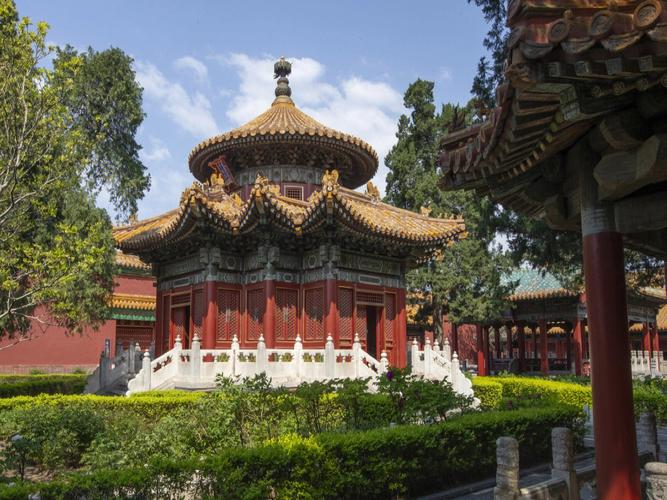
The Role of the Hall of Imperial Peace in the Imperial Garden
A Sanctuary of Tranquility and Spiritual Balance
The Hall of Imperial Peace, or Qin'an Dian in Chinese, stands as a pivotal structure within the intricate layout of the Forbidden City's Imperial Garden. More than just an architectural marvel, the hall played a significant role in the lives of the emperors and empresses who resided within the palace walls. Its purpose transcended mere aesthetics, serving as a sanctuary of tranquility, a center for spiritual balance, and a space for important rituals.
A Haven for Taoist Worship and Imperial Rituals
- Center of Taoist Worship: The Hall of Imperial Peace served as a dedicated space for Taoist worship, a significant religious tradition embraced by the imperial court, particularly during the Ming and Qing dynasties. Emperors, believing in the Taoist principle of attaining harmony with the universe, performed rituals here to ensure the well-being of the empire and the prosperity of their reign.
- Honoring Zhenwu, the Deity of the North: The hall housed the revered deity Xuanwu, later known as Zhenwu, a powerful god in Taoist belief associated with water, protection, and martial prowess. The emperors, recognizing Zhenwu's dominion over the north, a direction symbolically linked to potential threats, paid homage to him to safeguard the empire from invasion and disaster.
- Performance of Sacrificial Rituals: The hall's central location within the Imperial Garden made it an ideal setting for grand sacrificial ceremonies. These rituals, often conducted on significant dates in the lunar calendar, involved elaborate offerings, prayers, and performances by court musicians and dancers. The ceremonies aimed to appease the heavens, ensure good harvests, and maintain cosmic balance.
An Oasis of Serenity within the Bustling Palace
- A Retreat for the Imperial Family: Beyond its religious function, the Hall of Imperial Peace provided a serene retreat for the imperial family from the pressures of court life. Surrounded by the lush greenery and tranquil ambiance of the Imperial Garden, the hall offered a space for contemplation, reflection, and respite from the rigid formality of palace life.
- Celebrating Birthdays and Special Occasions: The hall's association with auspiciousness and harmony extended to its use for celebrating significant events in the lives of the imperial family. Emperors and empresses often held birthday celebrations and other joyous occasions within the hall, transforming it into a space of familial intimacy and shared happiness.
The Hall's Enduring Significance
The Hall of Imperial Peace, while seemingly modest in size compared to other grand halls within the Forbidden City, played an outsized role in the lives of the emperors and empresses. It embodies the confluence of religious devotion, political symbolism, and personal respite that characterized life within the imperial palace. Today, the hall stands as a testament to the enduring influence of Taoist beliefs on Chinese history and culture, offering visitors a glimpse into the spiritual world of China's imperial past.
Questions for Reflection:
- How does the architectural design of the Hall of Imperial Peace reflect its purpose as a place of worship and serenity?
- What does the choice of Zhenwu as the principal deity worshipped in the hall reveal about the concerns and priorities of the emperors?
- In what ways does the Hall of Imperial Peace exemplify the interconnectedness of religion, politics, and personal life within the context of the Forbidden City?